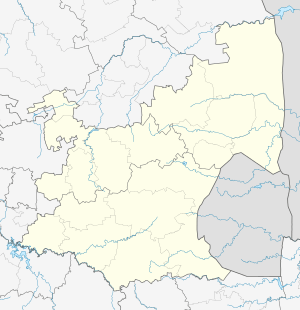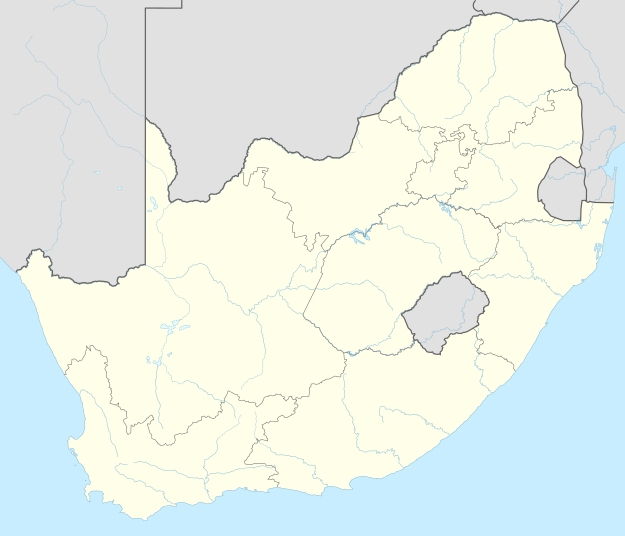Lydenburg
Lydenburg is a town in Thaba Chweu Local Municipality, Mpumalanga, South Africa. Alternatively known as Mashishing, Lydenburg is situated on the Sterkspruit/Dorps River tributary of the Lepelle River at the base of the Long Tom Pass. The name is derived from the Dutch Lijdenburg, or "Town of Suffering".[2] Lydenburg has become the centre of the South African fly-fishing industry and is an agricultural and mining hub.
Lydenburg Mashishing | |
|---|---|
Dutch Reformed Church, Lydenburg | |
 Lydenburg  Lydenburg | |
| Coordinates: 25.096°S 30.446°E | |
| Country | South Africa |
| Province | Mpumalanga |
| District | Ehlanzeni |
| Municipality | Thaba Chweu |
| Area | |
| • Total | 17.31 km2 (6.68 sq mi) |
| Population (2011)[1] | |
| • Total | 37,258 |
| • Density | 2,200/km2 (5,600/sq mi) |
| Racial makeup (2011) | |
| • Black African | 75.3% |
| • Coloured | 1.4% |
| • Indian/Asian | 0.5% |
| • White | 22.5% |
| • Other | 0.3% |
| First languages (2011) | |
| • Northern Sotho | 26.2% |
| • Afrikaans | 22.8% |
| • Swazi | 18.7% |
| • Zulu | 13.1% |
| • Other | 19.2% |
| Time zone | UTC+2 (SAST) |
| Postal code (street) | 1120 |
| PO box | 1120 |
| Area code | 013 |
| Historical states in present-day South Africa |
|---|
 |
|
before 1600
|
|
1600–1700
|
|
1700–1800
|
|
1800–1850
|
|
1850–1875
|
|
1875–1900
|
|
1900–present
|
|
|
History
The earliest known forms of African sculpture in southern Africa dating back to AD 400 were found in the area in the late 1950s. Mashishing later renamed Lydenburg was colonized in 1849 by a group of Voortrekkers under the leadership of Andries Potgieter when they abandoned their previous settlement Ohrigstad (to the north) due to a malaria epidemic. The town became the capital of the Lydenburg Republic ('De Republiek Lydenburg in Zuid Afrika') in 1856 and later in 1857 joined the Republic of Utrecht but in 1860 both these republics joined the Zuid Afrikaanse Republiek (ZAR).The town became the capital of the Lydenburg District of the South African Republic (ZAR).
Lydenburg became important because it was on the wagon route to the port of Delagoa Bay (now Maputo Bay) which was free of British control. In 1871 construction of the road was started by Abraham Espag under the orders of President Thomas François Burgers. The first wagons arrived in Lydenburg from Delagoa Bay in 1874.
On 6 February 1873 alluvial gold was discovered and within 3 months the Lydenburg goldfields was proclaimed. The First Boer War broke out between Britain and the Transvaal Republic in 1880. A British garrison under Lieutenant Walter Hillyar Colquhoun Long (uncle of the 1st Viscount Long) took control of Lydenburg to control the goldfields. It was from here that the ill-fated 94th Regiment under the command of Lieutenant-Colonel Philip Robert Anstruther marched to Pretoria. The remainder of the garrison at Lydenburg was besieged from 6 January 1881,[3] following Long's refusal to surrender the garrison on 23 December 1880.[4]
By 1910 the railway reached Lydenburg. In 1927 Lydenburg became a municipality.
Name change
In June 2006 it was announced that Arts and Culture minister, Pallo Jordan, approved the name change of Lydenburg back to its original name Mashishing (meaning "long, green grass").[5] However the decision was taken to court and ruled illegal and ordered the name to be changed back to Lydenburg. However the Township outside Lydenburg is called Mashishing. Road signs still say Lydenburg and businesses and local building such as the Lydenburg Museum have still kept the old name. However some road signs say Mashishing when a person is actually entering the more developed, richer, Lydenburg area.
See also
References
- "Sub Place Lydenburg". Census 2011.
- South Africa
- M. Gough Palmer. "The Besieged Towns of the First Boer War, 1880-1881". Retrieved 15 December 2013.
The Boers took up a position two miles off on the road to Middelburg on 3 January 1881 and commenced their attack on the 6th.
- M. Gough Palmer. "The Besieged Towns of the First Boer War, 1880-1881". Retrieved 15 December 2013.
On 23 December Long was visited by Dietrich Muller who said he had been deputed by the Boer Government to demand the immediate surrender of the garrison which was refused by Long.
- http://www.news24.com/SouthAfrica/News/Lydenburg-takes-on-new-name-20060906
.svg.png)